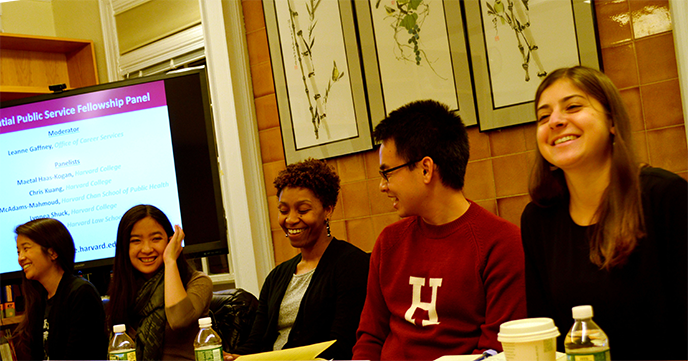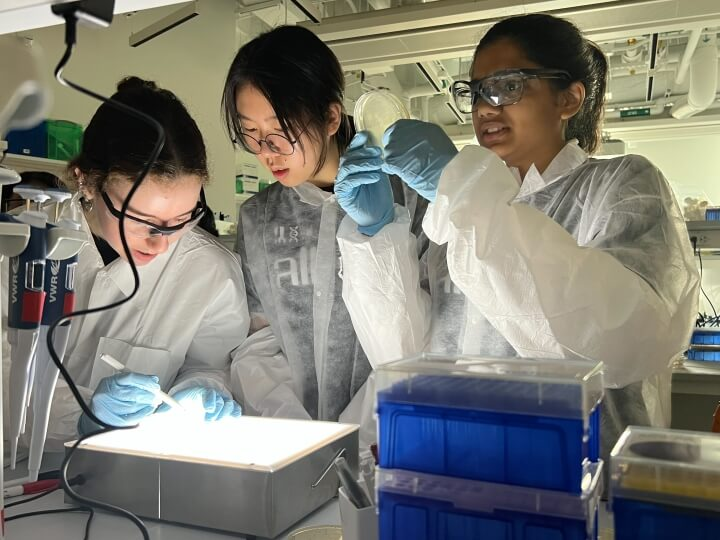
The Harvard Public Service Fellowships provide a unique opportunity for students to engage deeply with community service programs, fostering a commitment to public good that resonates throughout their careers. Established in 2011, these fellowships are a vital part of Harvard University initiatives aimed at encouraging students to explore the intersections of education and public health. Fellows are not just passive participants; they actively lead projects that address pressing societal needs, including K-12 literacy programs and health initiatives for underserved communities. Through their immersive summer experiences, students like Lucy Tu ’24 have showcased how public service can provide a profound understanding of the challenges that many face while also highlighting the potential for change. This innovative program not only offers financial support; it empowers students to envision their future roles as leaders dedicated to making a difference in the world.
Harvard’s initiative for Public Service Fellowships is more than just a financial backing; it’s an invitation for aspiring leaders to delve into meaningful community engagement. These fellowships serve as a bridge between academic theories and real-world challenges, particularly in sectors like education and healthcare. Students partake in transformative projects that enhance K-12 educational outcomes and support public health efforts, embodying the essence of service. By participating in this program, fellows gain hands-on experience that shapes their understanding of societal issues, fostering a culture of empathy and action. This proactive approach to public service not only enriches their personal growth but also strengthens communities, ensuring that the spirit of service is alive and well in future generations.
Overview of Harvard Public Service Fellowships
The Harvard Public Service Fellowships offer unique opportunities for students eager to make a difference in their communities while gaining first-hand experience in the public service sector. Since its inception in 2011, this prestigious program has supported numerous students, allowing them to engage in transformative projects across various fields, including education, public health, and social justice. By providing financial assistance and resources, these fellowships encourage students to explore not only the challenges faced by marginalized communities but also the potential for meaningful contributions.
Participants in the Harvard Public Service Fellowships program are selected based on their commitment to effecting positive change in society. They often work in under-resourced environments, such as rural schools, homeless shelters, or public health organizations, where they can apply their academic knowledge to real-world issues. This hands-on approach enables fellows to understand the intricate dynamics of public service, thereby fostering a generation of leaders who are well-prepared to tackle pressing issues in our communities.
Impact of Community Service Programs
Community service programs are essential for nurturing civic responsibility among students. Initiatives like the Harvard Public Service Fellowships not only facilitate impactful projects but also instill a sense of duty towards societal welfare in participants. Through structured projects, students often gain insights into systemic issues such as healthcare access or education disparity while building valuable skills in leadership and empathy. Such experiences can significantly shape their future career choices, steering them towards roles that prioritize public service and community betterment.
Moreover, these programs create a ripple effect in communities, inspiring others to engage in service and advocacy. As students return from their fellowships, they become advocates for change within their circles, motivating peers and younger generations to seek similar experiences. The success of community service programs lies not just in the immediate impact they have on specific populations, but also in their ability to create long-lasting networks of support and engagement across various sectors.
The Role of Education in Public Health Initiatives
Education and public health are intrinsically linked; effective health initiatives often rely on informed communities. Programs funded by Harvard Public Service Fellowships, such as literacy campaigns, can increase awareness and understanding of critical health issues. For instance, fellows whom Lucy Tu leads in K-12 health and science literacy programs help students grasp fundamental health concepts, equipping them with knowledge that can lead to healthier lifestyle choices and informed decision-making.
Furthermore, educating young individuals about public health issues fosters a culture of prevention that can profoundly impact society’s overall health standards. As students learn about their own health and the factors influencing it, they are more likely to engage proactively in community wellness initiatives. This educational approach effectively empowers future leaders in health policy and practice while addressing widespread public health challenges from the ground up.
Key Takeaways from Fellow Experiences
The experiences shared by the fellows highlight the transformative nature of their assignments and the deep connections formed within the communities they serve. For example, Hilary Adeleke’s work with Boston Healthcare for the Homeless underscored how policy impacts daily lives, revealing the interconnectedness of systemic health issues and individual experiences. Similarly, Joseph Wilson’s reflections on mentoring Black students illustrated the vital roles that representation and mentorship play in shaping the aspirations of young scholars.
Fellow experiences often resonate beyond individual projects, creating an enduring legacy of public service philosophy among participants. As these students embrace the lessons learned during their internships, they return to Harvard with renewed purpose, eager to implement sustainable solutions for the challenges their communities face. This cycle of service not only benefits future students but also enhances Harvard’s commitment to fostering a compassionate and socially aware generation.
Future Directions for Public Service Fellowships
As the landscape of public service evolves, so too must programs like the Harvard Public Service Fellowships. Continuous adaptation to address emerging social issues is crucial to ensure that students remain engaged and motivated to make impactful contributions. The fellowship’s administrators are actively seeking to introduce more diverse opportunities that encompass a broader range of public interests, especially as societal needs change and new challenges arise.
Implementing technology-driven solutions or increasing collaborative efforts with local organizations can help expand the fellowship’s reach and efficacy. By aligning student interests with pressing community needs, future iterations of the program can attract more participants while ensuring that their projects resonate on deeper levels, ultimately enhancing the overall societal impact of their work in public service.
Promoting K-12 Literacy Programs
K-12 literacy programs play a foundational role in shaping future generations, and the significant contributions from fellows like Lucy Tu are testimony to this necessity. By cultivating literacy in science and health, students are equipped not only with knowledge but the critical thinking skills essential to navigate complex information. These programs also bridge gaps in understanding, particularly for students from underserved backgrounds, ensuring that all children have access to the tools they need to succeed academically.
Furthermore, these initiatives often stimulate collaborative efforts between educational institutions and public health organizations, creating a comprehensive approach to learning and wellness. By integrating literacy programs into the K-12 curriculum, educators can help foster a generation that is both informed and capable of advocating for their health and well-being, ultimately resulting in a more knowledgeable and engaged populace.
Reflections on Service Learning
Service learning has proven to be an invaluable teaching and learning strategy, blending academic knowledge with practical experience. Through the work of the Harvard Public Service Fellowships, students not only apply what they’ve learned in the classroom but also gain insights into the real-world impact of their chosen disciplines. This reflective practice allows fellows to critically analyze their experiences and understand their roles within broader societal contexts, fostering deeper connections with their communities.
Students often articulate that their service learning experiences challenge their preconceived notions and enhance their commitment to social equity. By engaging directly with community members and witnessing the challenges they face, fellows cultivate empathy and a sense of responsibility that translates into future endeavors. This integration of service and learning not only enriches Harvard’s educational environment but also contributes to the overall mission of promoting public service.
Strengthening Future Generations Through Public Service
Public service is a powerful tool for strengthening communities and supporting future generations. The Harvard Public Service Fellowships illustrate how such initiatives can inspire students to take active roles in shaping the world around them. Through their internships and community engagement, fellows learn the importance of civic responsibility and the impact of dedicated service, planting the seeds for lifelong commitments to social change.
As they transition into their professional paths, many fellows carry forward the lessons learned during their public service projects. The personal connections forged and the issues encountered nurture a stronger sense of purpose, guiding them towards careers that prioritize community welfare. In a world increasingly defined by challenges, the values instilled through programs like the Harvard Public Service Fellowships are essential for cultivating the change-makers of tomorrow.
Advocating for Systemic Change
The need for systemic change is evident across various sectors, from education and public health to social justice. The experiences of fellows in the Harvard Public Service Fellowships provide critical insights into the complexities of these systems and the myriad challenges they confront. By partnering with organizations that directly address these issues, fellows gain valuable experience and contribute to meaningful advocacy efforts aimed at enacting change.
Advocacy extends beyond individual projects; it involves understanding the larger implications of policy, resource allocation, and societal structures. Many fellows emerge from their experiences with a renewed commitment to not just participate in public service but to advocate for reforms that pave the way for a more equitable system. By equipping the next generation with the awareness and skills needed to challenge the status quo, these programs play a vital role in fostering long-term societal improvement.
Frequently Asked Questions
What are the Harvard Public Service Fellowships?
The Harvard Public Service Fellowships program, launched in 2011, provides students with financial support to engage in community service programs. Recipients explore careers in public service by participating in summer projects that address pressing needs in education, public health, and social services.
How does the Harvard Public Service Fellowship support K-12 literacy programs?
The Harvard Public Service Fellowship encourages students to lead initiatives like K-12 literacy programs. Fellows, such as Lucy Tu ’24, design and implement literacy projects that promote education and health within local communities, reinforcing the importance of public engagement.
What sectors do Harvard Public Service Fellows work in?
Harvard Public Service Fellows are placed in various sectors, including education, public health, government, and social services. Their projects often involve direct service in under-resourced communities, allowing them to make a tangible impact.
Can Harvard Public Service Fellowships influence career paths?
Yes, participating in the Harvard Public Service Fellowships significantly impacts students’ career paths by providing hands-on experience in public service roles. Many fellows, like Hilary Adeleke ’24, find their interests in medicine and policy strengthened through these initiatives.
What types of projects do recipients of the Harvard Public Service Fellowships undertake?
Recipients of the Harvard Public Service Fellowships engage in diverse projects, such as guiding individuals through the criminal justice system, serving in rural schools, and supporting health initiatives for marginalized communities. These projects aim to address systemic challenges and enhance public service.
How has Harvard University demonstrated its commitment to public service through these fellowships?
Harvard University showcases its commitment to public service through the Public Service Fellowships by enabling students to apply their academic knowledge in real-world settings. This initiative exemplifies Harvard’s mission to give back and fosters a culture of civic engagement among students.
What impact do the fellowships have on students’ perspectives about public service?
The Harvard Public Service Fellowships broaden students’ understanding of public service, encouraging them to consider how policy affects community health and education. Experiences in this program help students recognize the value of service and the potential for change in their communities.
How do students apply for the Harvard Public Service Fellowships?
Students interested in the Harvard Public Service Fellowships typically need to submit an application outlining their proposed project, the community needs it addresses, and their qualifications. Specific requirements and deadlines can be found on the Harvard University initiative’s official website.
What unique opportunities do the Harvard Public Service Fellowships provide compared to other fellowships?
Unlike many other fellowships, the Harvard Public Service Fellowships focus specifically on community impact and personal growth through direct service to underserved populations. They also emphasize collaboration with organizations that aim to solve societal challenges, making public service accessible and rewarding.
How can the Harvard Public Service Fellowships inspire future leaders in public health and education?
The Harvard Public Service Fellowships cultivate future leaders by equipping students with practical experience in public health and education. By engaging in hands-on projects, fellows develop essential skills and insights that empower them to champion social change and advocate for improved community outcomes.
| Fellow Name | Project Description | Location | Key Learnings |
|---|---|---|---|
| Lucy Tu ’24 | K-12 health and science literacy program | New York City | Importance of funding in public service exploration; bringing awareness to health literacy. |
| Hilary Adeleke ’24 | Case manager for Boston Healthcare for the Homeless | Boston, MA | Connection between medicine, policy, and sustainable healthcare; recognizing the impact of policy on marginalized communities. |
| Joseph Wilson | Summer camp counselor for Black students | Jamaica Plain, MA | Significance of role modeling and instilling ambition in youth regarding advanced education. |
Summary
Harvard Public Service Fellowships provide a transformative opportunity for students to engage in impactful community service while gaining practical experience in various fields like education, healthcare, and social services. Through projects such as teaching health literacy and assisting underserved populations, fellows gain valuable insights into public service, ultimately empowering them to envision careers dedicated to the common good. These fellowships not only facilitate funding for meaningful work but also inspire and challenge students to contribute positively to their communities, fostering a culture of service that resonates throughout Harvard University.







